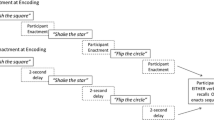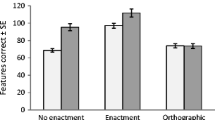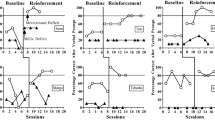Abstract
A central-incidental task of selective attention was administered to 100 learning-disabled boys — 48 younger children (81/2–101/2 years) and 52 older children (101/2–121/2 years). Subjects at both age levels were assigned to one of four conditions: (a) a standard condition; (b) a rehearsal condition, in which subjects were taught a verbal rehearsal strategy; (c) a reinforcement condition, in which correct responses were rewarded; and (d) a combined rehearsal-reinforcement condition. Older subjects recalled more central task but not more incidental task information than younger subjects. A measure of selective attention efficiency was also greater for older than for younger subjects. Central recall in the rehearsal-reinforcement condition was greater than in any other condition. Central recall was greater in the rehearsal condition than in the standard and reinforcement conditions. Selective attention efficiency was greater for both rehearsal conditions than for both nonrehearsal conditions. Incidental recall was higher for reinforcement subjects than for rehearsal subjects. Results suggest that induced verbal rehearsal improves central recall and selective attention in learning-disabled children. Reinforcement alone does not improve central recall but may when paired with rehearsal.
Similar content being viewed by others
References
Donaldson, M., & Strang, H. Primacy effect in short-term memory in young children.Psychonomic Science, 1969,16, 59–60.
Druker, J. F., & Hagen, J. W. Developmental trends in the processing of task-relevant and task-irrelevant information.Child Development, 1969,40, 371–382.
Flavell, J. H., Beach, D. R., & Chinsky, J. M. Spontaneous verbal rehearsal in a memory task as a function of age.Child Development, 1966,37, 283–299.
Hagen, J. W. The effect of distraction on selective attention.Child Development, 1967,38, 685–694.
Hagen, J. W. Some thoughts on how children learn to remember.Human Development, 1971,14, 262–271.
Hagen, J. W., Hargrave, S., & Ross, W. Prompting and rehearsal in short-term memory.Child Development, 1973,44, 201–204.
Hagen, J. W., & Kail, R. V. Facilitation and distraction in short-term memory.Child Development, 1973,44, 831–836.
Hagen, J. W., & Kail, R. V. The role of attention in perceptual and cognitive development. In W. M. Cruikshank & D. P. Hallahan (Eds.),Perceptual and learning disabilities in children (Vol. 2).Research and theory. Syracuse, New York: Syracuse University Press, 1975.
Hagen, J. W., Meacham, J. A., & Mesibov, G. Verbal labeling, rehearsal, and short-term memory.CogntivePsychology, 1970,1, 47–58.
Hagen, J. W., & Sabo, R. A. A developmental study of selective attention.Merrill-Palmer Quarterly, 1967,13, 159–172.
Hagen, J. W., & West, R. F. The effects of a pay-off matrix on selective attention.Human Development, 1970,13, 43–52.
Hallahan, D. P., Kauffman, J. M., & Ball, D. W. Selective attention and cognitive tempo of low achieving and high achieving sixth grade males.Perceptual and Motor Skills, 1973,36, 579–583.
Hallatian, D. P., Kauffman, J. M., & Ball, D. W. Effects of stimulus attenuation on selective attention performance of children.Journal of Genetic Psychology, 1974,125, 71–77.
Hallahan, D. P., Tarver, S. G., Kauffman, J. M., & Graybeal, N. L. Selective attention abilities of learning disabled children under reinforcement and response cost.Journal of Learning Disabilites, 1978,11, 430–438.
Hallahan, D. P., & Reeve, R. E. Selective attention and distractibility. In B. K. Keogh (Ed.),Advances in special education (Vol. 1). Greenwich, Connecticut: J.A.I. Press, in press.
Kauffman, J. M., & Hallahan, D. P. Learning disability and hyperactivity. In B. B. Lahey & A. E. Kazdin (Eds.),Advances in child clinical psychology (Vol. 2). New York: Plenum, 1979.
Kausler, D. J., Laughlin, P. R., & Trapp, E. P. Effects of incentive set on relevant and irrelevant (incidental) learning in children.Child Development, 1963,34, 195–199.
Kingsley, P. R., & Hagen, J. W. Induced versus spontaneous rehearsal in short-term memory in nursery school children.Developmental Psychology, 1969,1, 40–46.
Maccoby, E. E., & Hagen, J. W. Effects of distraction upon central versus incidental recall: Developmental trends.Journal of Experimental Child Psychology, 1965,2, 280–289.
McCarver, R. B. A developmental study of the effect of organizational cues on short-term memory.Child Development, 1972,43, 1317–1325.
Pelham, W. E., & Ross, A. O. Selective attention in children with reading problems: A developmental study of selective attention.Journal of Abnormal Child Psychology, 1977,5, 1–8.
Ross, A. O.Psychological aspects of learning disabilities and reading disorders. New York: McGraw-Hill, 1976.
Sabo, R. A., & Hagen, J. W. Color cues and rehearsal in short-term memory.Child Development, 1973,44, 77–82.
Tarver, S. G., Hallahan, D. P., Cohen, S. B., & Kauffman, J. M. The development of visual selective attention and verbal rehearsal in learning disabled boys.Journal of Learning Disabilities, 1977,10, 491–500.
Tarver, S. G., Hallahan, D. P., Kauffman, J. M., & Ball, D. W. Verbal rehearsal and selective attention in children with learning disabilities: A developmental lag.Journal of Experimental Child Psychology, 1976,22, 375–385.
Torgesen, J. K. The role of nonspecific factors in the task performance of learning disabled children: A theoretical assessment.Journal of Learning Disabilities, 1977,10, 27–34.
Torgesen, J. K., & Goldman, T. Verbal rehearsal and short-term memory in reading-disabled children.Child Development, 1977,48, 56–60.
Wheeler, R. J., & Dusek, J. B. The effects of attentional and cognitive factors on children's incidental learning.Child Development, 1973,44, 253–258.
Author information
Authors and Affiliations
Additional information
This article is based on a Ph.D. dissertation completed by the senior author at the University of Virginia. Preparation of this article was supported in part by a contract (300-77-0495) from the Bureau of Education for the Handicapped, Office of Education, for the University of Virginia Learning Disabilities Research Institute.
Rights and permissions
About this article
Cite this article
Dawson, M.M., Hallahan, D.P., Reeve, R.E. et al. The effect of reinforcement and verbal rehearsal on selective attention in learning-disabled children. J Abnorm Child Psychol 8, 133–144 (1980). https://doi.org/10.1007/BF00918168
Issue Date:
DOI: https://doi.org/10.1007/BF00918168




